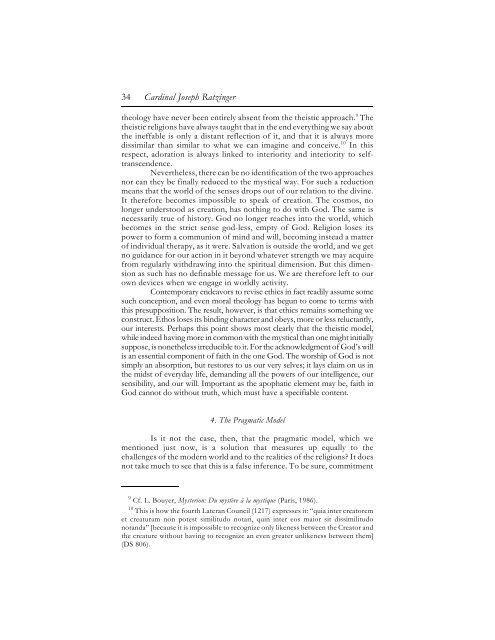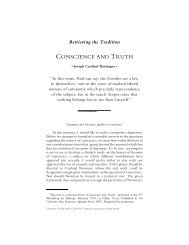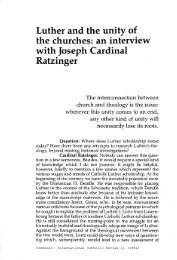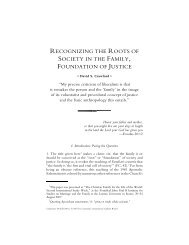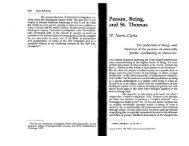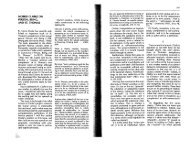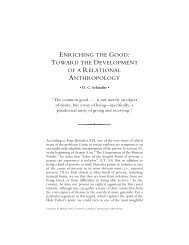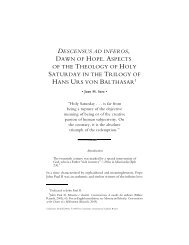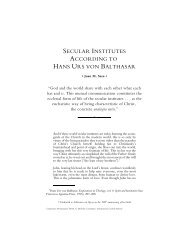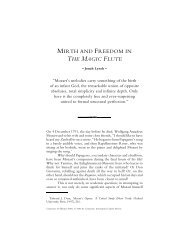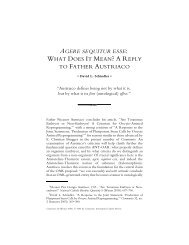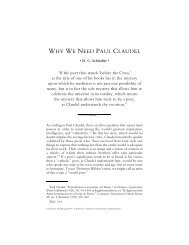Interreligious Dialogue and Jewish-Christian Relations - Communio
Interreligious Dialogue and Jewish-Christian Relations - Communio
Interreligious Dialogue and Jewish-Christian Relations - Communio
Create successful ePaper yourself
Turn your PDF publications into a flip-book with our unique Google optimized e-Paper software.
34 Cardinal Joseph Ratzinger<br />
theology have never been entirely absent from the theistic approach. 9 The<br />
theistic religions have always taught that in the end everything we say about<br />
the ineffable is only a distant reflection of it, <strong>and</strong> that it is always more<br />
dissimilar than similar to what we can imagine <strong>and</strong> conceive. 10 In this<br />
respect, adoration is always linked to interiority <strong>and</strong> interiority to selftranscendence.<br />
Nevertheless, there can be no identification of the two approaches<br />
nor can they be finally reduced to the mystical way. For such a reduction<br />
means that the world of the senses drops out of our relation to the divine.<br />
It therefore becomes impossible to speak of creation. The cosmos, no<br />
longer understood as creation, has nothing to do with God. The same is<br />
necessarily true of history. God no longer reaches into the world, which<br />
becomes in the strict sense god-less, empty of God. Religion loses its<br />
power to form a communion of mind <strong>and</strong> will, becoming instead a matter<br />
of individual therapy, as it were. Salvation is outside the world, <strong>and</strong> we get<br />
no guidance for our action in it beyond whatever strength we may acquire<br />
from regularly withdrawing into the spiritual dimension. But this dimension<br />
as such has no definable message for us. We are therefore left to our<br />
own devices when we engage in worldly activity.<br />
Contemporary endeavors to revise ethics in fact readily assume some<br />
such conception, <strong>and</strong> even moral theology has begun to come to terms with<br />
this presupposition. The result, however, is that ethics remains something we<br />
construct. Ethos loses its binding character <strong>and</strong> obeys, more or less reluctantly,<br />
our interests. Perhaps this point shows most clearly that the theistic model,<br />
while indeed having more in common with the mystical than one might initially<br />
suppose, is nonetheless irreducible to it. For the acknowledgment of God’s will<br />
is an essential component of faith in the one God. The worship of God is not<br />
simply an absorption, but restores to us our very selves; it lays claim on us in<br />
the midst of everyday life, dem<strong>and</strong>ing all the powers of our intelligence, our<br />
sensibility, <strong>and</strong> our will. Important as the apophatic element may be, faith in<br />
God cannot do without truth, which must have a specifiable content.<br />
4. The Pragmatic Model<br />
Is it not the case, then, that the pragmatic model, which we<br />
mentioned just now, is a solution that measures up equally to the<br />
challenges of the modern world <strong>and</strong> to the realities of the religions It does<br />
not take much to see that this is a false inference. To be sure, commitment<br />
9 Cf. L. Bouyer, Mysterion: Du mystère à la mystique (Paris, 1986).<br />
10 This is how the fourth Lateran Council (1217) expresses it: “quia inter creatorem<br />
et creaturam non potest similitudo notari, quin inter eos maior sit dissimilitudo<br />
not<strong>and</strong>a” [because it is impossible to recognize only likeness between the Creator <strong>and</strong><br />
the creature without having to recognize an even greater unlikeness between them]<br />
(DS 806).


